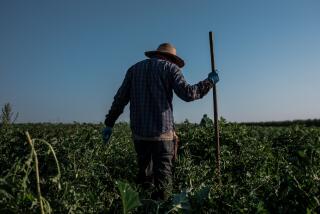Farm Workers Win Round in Court
SAN DIEGO — In a legal victory for the United Farm Workers union, an appeals court in Arizona on Wednesday threw out a $3.7-million judgment against the union won by a major lettuce grower, the latest twist in a protracted court battle that Cesar Chavez was fighting the day he died.
In a ruling made public Wednesday, the appeals court in Phoenix found that the trial judge in Yuma was wrong in giving jury instructions that were preferential to the Salinas-based Bruce Church Inc. The instructions were hotly contested at the time by Michael Aguirre, a San Diego attorney representing the UFW.
The case will return to Yuma for what would be the third trial if the company continues to press for damages from the boycott against it started by the UFW.
Steve Taylor, chief executive officer of Bruce Church, the nation’s third largest grower of lettuce, said the court ruling left him “frustrated and disappointed,” and added that company officials will have to decide whether pursuing a third trial is worth adding to the legal costs and time already devoted to the case.
Under Chavez’s son-in-law, Arturo Rodriguez, the union has begun to reverse--in membership and contracts with growers--the declining fortunes it suffered during the final years of Chavez’s leadership.
Rodriguez called the court decision “a vindication of Cesar Chavez” and said it “lifts a tremendous financial burden from the UFW.”
“Cesar gave his last ounce of strength defending the farm workers in this case,” Rodriguez said. “He died standing up for their 1st Amendment right to speak out for themselves.”
The dispute with Church began when the UFW, unable to force the company to sign a labor agreement, started a boycott in 1979 asking consumers not to shop at supermarkets in California that sold Church lettuce. Ten grocery chains quit buying Church lettuce.
The agricultural giant struck back with a lawsuit in Arizona, where it grows some of its lettuce and where the law is viewed as less friendly to unions.
In 1988, a jury awarded Church $5.4 million, based on an Arizona law banning secondary boycotts. Those are boycotts not against a company, but against other targets doing business with that company. The jury decision was thrown out when the Arizona appeals court said the law was not applicable because the boycott occurred in California rather than Arizona.
In the second trial in April 1993, Chavez had spent a second withering day of examination by Church’s attorneys and then, while staying at the home of a supporter, died that night in his sleep at age 63.
The retrial was marked by repeated clashes between Aguirre and Judge Joseph D. Howe.
One jury instruction enraged Aguirre. In it, Howe told the jury that the UFW could be found liable if its boycott had interfered with the business relationship between Church and the supermarkets.
To Aguirre, the instruction was tantamount to invoking the anti-secondary boycott rule that the appeals court had said was improper. The appeals court agreed that the instruction was wrong.
The jury, relying on that instruction, found by a vote of 9 to 3 that the UFW had engaged in outrageous conduct during the boycott and awarded Church $2.9 million, less than a third of what the company had requested. With interest, the judgment has grown to $3.7 million.
Part of the retrial concerned the veracity of claims by the UFW about Church’s treatment of its workers. The company said such claims, including one that a worker lost an arm because of its negligence, were outrageous.
The appeals court said that a company such as Church is a kind of public figure, and must prove malice and reckless disregard for the truth before statements can be found libelous or worthy of damages.
More to Read
Inside the business of entertainment
The Wide Shot brings you news, analysis and insights on everything from streaming wars to production — and what it all means for the future.
You may occasionally receive promotional content from the Los Angeles Times.










